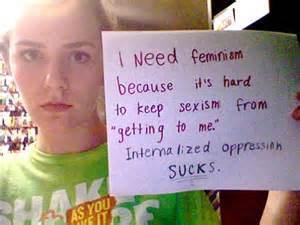“The Tyranny of the Home-Cooked Family Dinner”

Author and perpetual feminist victim Amanda Marcotte
Slate: The home-cooked meal has long been romanticized, from ’50s-era sitcoms to the work of star food writer Michael Pollan, who once wrote, “far from oppressing them, the work of cooking approached in the proper spirit offered a kind of fulfillment and deserved an intelligent woman’s attention.” In recent years, the home-cooked meal has increasingly been offered up as the solution to our country’s burgeoning nutrition-related health problems of heart disease and diabetes. But while home-cooked meals are typically healthier than restaurant food, sociologists Sarah Bowen, Sinikka Elliott, and Joslyn Brenton from North Carolina State University argue that the stress that cooking puts on people, particularly women, may not be worth the trade-off.

The researchers interviewed 150 mothers from all walks of life and spent 250 hours observing 12 families in-depth, and they found “that time pressures, tradeoffs to save money, and the burden of pleasing others make it difficult for mothers to enact the idealized vision of home-cooked meals advocated by foodies and public health officials.” The mothers they interviewed had largely internalized the social message that “home-cooked meals have become the hallmark of good mothering, stable families, and the ideal of the healthy, productive citizen,” but found that as much as they wanted to achieve that ideal, they didn’t have the time or money to get there. Low-income mothers often have erratic work schedules, making it impossible to have set meal times. Even for middle-class working mothers who are able to be home by 6 p.m., trying to cook a meal while children are demanding attention and other chores need doing becomes overwhelming.
Money is also a problem (I wonder why?). Low-income women often don’t have the money for fresh produce and, in many cases, can’t afford to pay for even a basic kitchen setup. One low-income mother interviewed “was living with her daughter and two grandchildren in a cockroach- and flea-infested hotel room with two double beds,” and was left to prepare “all of their food in a small microwave, rinsing their utensils in the bathroom sink.” Even when people have their own homes, lack of money means their kitchens are small (oh noes, confined cooked space!), pests are hard to keep at bay, and they can’t afford “basic kitchen tools like sharp knives, cutting boards, pots and pans.” (Ever hear of Goodwill?)
Beyond just the time and money constraints, women find that their very own families present a major obstacle to their desire to provide diverse, home-cooked meals. The women interviewed faced not just children but grown adults who are whiny, picky, and ungrateful for their efforts (sounds like these families have spoiled brats). “We rarely observed a meal in which at least one family member didn’t complain about the food they were served,” the researchers write. Mothers who could afford to do so often wanted to try new recipes and diverse ingredients, but they knew that it would cause their families to reject the meals. “Instead, they continued to make what was tried and true, even if they didn’t like the food themselves.” The saddest part is that picky husbands and boyfriends (those evil men again) were just as much, if not more, of a problem than fussy children.
The researchers quote food writer Mark Bittman, who says that the goal should be “to get people to see cooking as a joy rather than a burden.” But while cooking “is at times joyful,” they argue, the main reason that people see cooking mostly as a burden is because it is a burden. It’s expensive and time-consuming and often done for a bunch of ingrates (as if every family is full of these) who would rather just be eating fast food anyway. If we want women—or gosh, men, too (as if men have never learned how to cook)—to see cooking as fun, then these obstacles need to be fixed first. And whatever burden is left needs to be shared.

DCG

